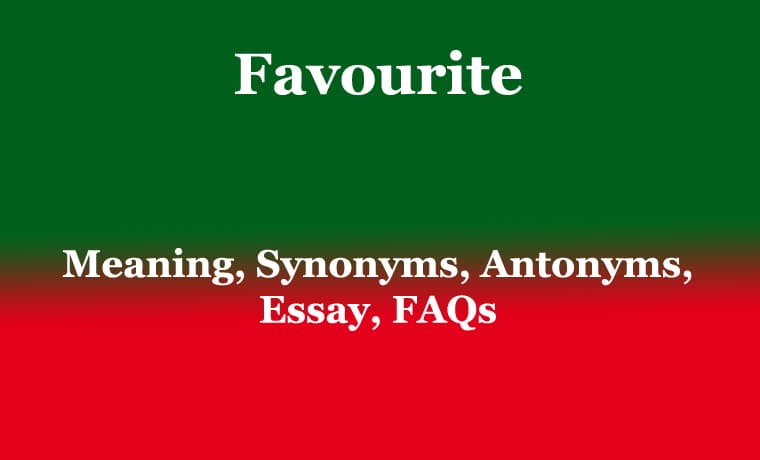Discover the meaning, uses, forms, synonyms, and antonyms of the word “favourite” in this comprehensive article. Explore its significance in daily life, psychology, culture, and consumer behavior. Learn how having a favourite shapes identity and decisions.
Favourite: Meaning, Synonyms, Antonyms, Essay, FAQs
Meaning of the Word “Favourite”
The word ‘favourite’ (Favorite) refers to something or someone that is preferred over others. It is often used to describe a person, place, activity, or object that someone likes the most or holds in special regard. The term is widely used to express personal preferences and choices in various contexts, from favorite foods to favorite people.
Use of “Favourite” in a Sentence
Chocolate ice cream has always been my ‘favourite’ dessert.
The teacher asked each student to name their ‘favourite’ book from the reading list.
Verb Form of “Favourite”
The term “favourite” is primarily used as a noun and an adjective. However, in modern usage, particularly in digital platforms like social media, the verb form ‘favourite’ (or ‘favorite’ in American English) can be used to indicate the act of marking something as a preferred or liked item.
Example in a sentence: ‘You can favourite this post by clicking the star icon.’
Adjective Form of “Favourite”
The word ‘favourite’ itself is an adjective when it describes something that is preferred or liked the most.
Example in a sentence: *Blue is her favourite color because it reminds her of the ocean.*
Other Forms of “Favourite”
Favouritism (noun): The practice of giving unfair preferential treatment to one person or group at the expense of others.
Example: The manager was accused of favouritism for promoting his friend over more qualified candidates.
Favourably (adverb): In a way that shows approval or preference.
Example: She looked favourably upon the proposal because it aligned with her interests.
Synonyms of “Favourite”
- Preferred: Liked or chosen above all others.
- Beloved: Deeply loved or cherished.
- Chosen: Selected or picked out as special.
- Best-loved: Held in the highest regard; the most loved.
- Pet: A person or thing that is particularly treasured.
Antonyms of “Favourite”
- Disliked: Not liked or enjoyed.
- Unfavorable: Not preferred or not liked.
- Least liked: The one liked the least among a group.
- Rejected: Not accepted or dismissed.
- Despised: Strongly disliked or hated.
You May Like:
Essay on Favourite
Introduction
The word ‘favorite’ is deeply ingrained in our daily lives, representing the choices and preferences that shape our experiences. From childhood memories of favorite toys to adult decisions about favorite activities or foods, the concept of having a favorite is universal. This essay explores the meaning, significance, and implications of the word “favorite,” examining how it influences our behavior, relationships, and even our identity.
Superficial Meaning
At its core, the word ‘favorite’ simply means something or someone that is liked more than others. This could be a favorite food, like pizza, or a favorite person, like a best friend. On the surface, declaring something as your favorite indicates a preference, a choice among many options. It reflects what brings you joy, comfort, or satisfaction.
For example, a child might say that ice cream is their favorite treat because it tastes sweet and makes them happy. An adult might have a favorite restaurant because they enjoy the atmosphere and the quality of the food. These superficial preferences are often tied to positive experiences, memories, and emotions.
Deeper Meaning
However, the concept of ‘favourite’ goes beyond simple preference. It is tied to identity, values, and personal experiences. What we consider our favourite often reveals a lot about who we are. Our favorite books, movies, or hobbies are not just things we enjoy; they are expressions of our personality and our worldview.
For instance, a person who loves reading science fiction might value creativity, imagination, and the exploration of the unknown. Someone whose favorite hobby is hiking might prioritize nature, physical fitness, and adventure. These preferences are shaped by our experiences, culture, and even the people we admire.
The idea of having a favourite also extends to relationships. In many cultures, people have a favorite sibling, friend, or colleague, someone with whom they share a special bond. This favoritism can be based on shared interests, mutual respect, or emotional connection. In some cases, having a favourite person can lead to feelings of exclusion or jealousy in others, highlighting the complex social dynamics involved.
The Role of Favourites in Daily Life
Favourites play a significant role in our daily lives, influencing our decisions, habits, and interactions. For example, when shopping for groceries, we might choose our favourite brand of cereal or our favorite type of fruit. These choices, while seemingly minor, contribute to our routine and sense of comfort.
In the workplace, favouritism can have both positive and negative effects. A manager who has a favorite employee may give them more opportunities or responsibilities, leading to faster career growth for that individual. However, this can also create tension among other employees who feel overlooked or undervalued.
In education, teachers may have favorite students, often those who perform well academically or participate actively in class. While this favoritism might encourage the favored student, it can also discourage others who feel they are not receiving the same level of attention or support.
In personal relationships, having a favourite person can strengthen bonds and create lasting friendships. However, it can also lead to feelings of exclusion or rivalry among others. Balancing these relationships requires sensitivity and awareness of the impact of favoritism on those around us.
Favourites in Culture and Society
Culturally, the concept of having a favorite is prevalent in various aspects of life, from entertainment to sports. People often have favorite actors, musicians, or athletes, whose work or performance resonates with them. This favoritism can lead to fan communities, where individuals share their admiration and support for their favorite public figures.
In sports, having a favorite team or player is common. Fans often passionately support their favorites, attending games, wearing team colors, and following their achievements closely. This favoritism creates a sense of belonging and identity, connecting people through shared interests and loyalties.
In the arts, people have favorite paintings, sculptures, or performances that inspire or move them. These favorites often hold personal significance, reflecting the individual’s tastes, values, or experiences. The arts allow people to explore their preferences and express their identity through their choices.
The Psychology of Favourites
Psychologically, the concept of having a favourite is tied to the human need for comfort, familiarity, and identity. When we declare something as our favourite, we are often seeking a sense of stability and reassurance. Our favorites provide us with a sense of continuity in a world that is constantly changing.
Favourites also play a role in decision-making. When faced with multiple options, choosing a favorite simplifies the process, reducing anxiety and uncertainty. This is why people often stick to their favorite brands, restaurants, or activities, even when new options are available.
Moreover, favorites can serve as a form of self-expression. By declaring something as our favourite, we communicate our preferences and values to others. This can strengthen social bonds, as people with similar favorites often feel a connection or understanding with each other.
The Impact of Favourites on Consumer Behavior
In the consumer world, the concept of favourites is central to marketing and branding. Companies strive to become the favorite choice of consumers by offering products or services that stand out. A brand that becomes a consumer’s favorite often enjoys customer loyalty, repeat business, and positive word-of-mouth.
Advertising campaigns often tap into the idea of favorites by highlighting how a product or service can become a consumer’s top choice. Slogans like “America’s favorite coffee” or “Your favorite way to start the day” are designed to create emotional connections and encourage brand loyalty.
Moreover, the rise of personalized marketing has made it easier for companies to cater to individual preferences. By analyzing consumer behavior, companies can identify what their customers like most and tailor their offerings to meet those needs. This creates a more personalized experience, increasing the likelihood that a product or service will become a consumer’s favorite.
Conclusion
In conclusion, the word ‘favorite’ is more than just a term to describe preference; it is a reflection of our identity, values, and experiences. Whether it is a favorite food, book, person, or brand, our favorites play a crucial role in shaping our daily lives, decisions, and relationships. The concept of having a favorite is deeply embedded in human psychology, culture, and society, influencing everything from personal choices to consumer behavior. Understanding the significance of favorites allows us to appreciate the complexity of human preferences and the impact they have on our lives.
FAQs About the Word “Favourite”
Q: What is the meaning of the word “favorite”?
A: The word ‘favorite’ refers to something or someone that is preferred over others, often held in special regard or liked the most.
Q: Can “favorite” be used as a verb?
A: Yes, “favorite” can be used as a verb in modern contexts, especially on digital platforms, meaning to mark something as liked or preferred.
Q: What is the adjective form of “favorite”?
A: The word ‘favorite’ itself serves as an adjective when it describes something that is preferred or liked the most.
Q: What are some synonyms for “favorite”?
A: Synonyms for “favorite” include preferred, beloved, chosen, best-loved, and pet.
Q: What are the antonyms of “favorite”?
A: Antonyms include disliked, unfavorable, least liked, rejected, and despised.
Q: How does having a favorite impact decision-making?
A: Having a favorite simplifies decision-making by providing a preferred choice, reducing anxiety and uncertainty. 0 0 0











